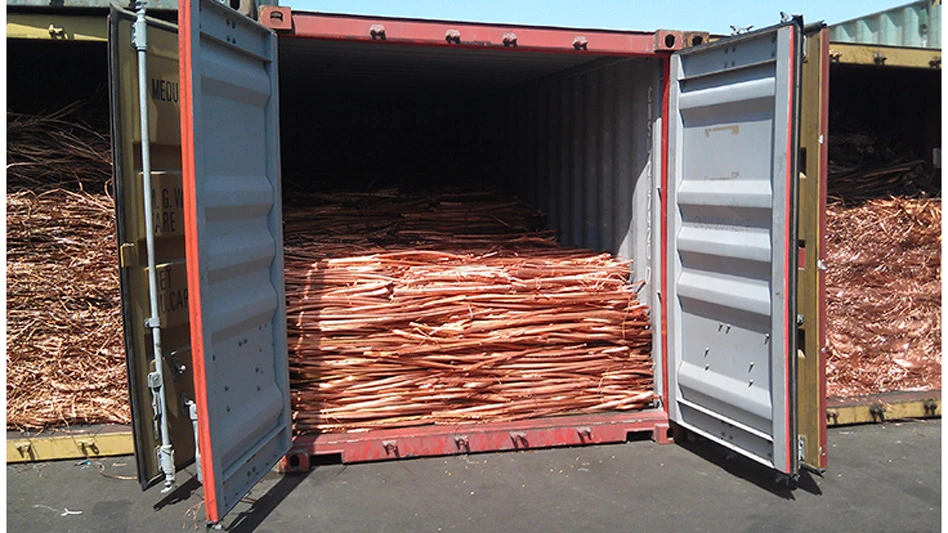
Recycling Today file photo
On April 9, President Donald Trump issued a 90-day pause on the “reciprocal” tariffs he announced April 2, opting instead to levy 10 percent tariffs beginning April 5 on all U.S. trading partners, with the exceptions of Canada and Mexico, rather than higher tariffs that were based on calculations that took countries’ trade deficits with the U.S. into account.
However, that same day, the president increased tariffs on most imports from China to 145 percent, effective immediately, in response to China’s retaliatory tariff of 125 percent on U.S. imports.
U.S.-based processors of recovered nonferrous metals, particularly copper, are likely to feel the impact of China’s increased tariff.
China’s retaliatory tariffs
Adam Shaffer, vice president of international trade and global affairs for the Recycled Materials Association, or ReMA, tells Recycling Today that recycled copper shipments from the U.S. to China represented nearly 10 percent of the total value of all U.S. exports of recycled and recyclable material last year.
“The increasing retaliatory measures imposed by the Chinese governments in response to the escalating reciprocal tariff rate imposed by the White House will cause significant disruption to U.S. trade in recycled copper as was similarly seen during parts of President Trump’s first term,” he says.
“Our industry has long been concerned about trade-restrictive measures and the potential impact of import tariffs on the competitiveness of the U.S. recycled materials industry, so this significant retaliation by China against U.S. exports of recycled products is going to be very disruptive if these tariffs remain in place for an extended period of time.”
Exclusions to “reciprocal” tariffs
Shaffer shares that six specific exclusions apply for the universal 10 percent tariffs that have been levied on most U.S. trading partners: products covered under the tariffs Trump imposed citing his power under the International Emergency Economic Powers Act; products subject to the Section 232 tariffs, such as steel and aluminum; copper, pharmaceuticals, semiconductors and lumber; articles that could become subject to future Section 232 tariffs; bullion; and energy and certain minerals that are not available in the U.S.
Shredder wear parts
The higher U.S. duty broadly on Chinese imports likely will not bode well for an extension of the shredder wear parts exclusion from the 301 tariffs, Shaffer says.
“Given the current dynamics of the U.S.-China trading relationship, there is a low likelihood that the administration will extend the exclusions any further beyond the current expiration of May 31, 2025," he continues.
Despite the current exclusion, Shaffer says, imports of shredder wear parts from China are subject to a combined 45 percent import duty—20 percent from the emergency border tariffs that were imposed starting in early February and increased in early March and a 25 percent tariff on the Section 232 aluminum derivatives product list, despite the fact that these wear parts are not made from aluminum.
“The president is not granting very many exclusions to the new tariffs, and he has effectively ended the other product exclusions and country exemptions from the Section 232 tariffs on steel and aluminum, for example, so while we are continuing to engage with USTR [U.S. Trade Representative] and the administration to extend the current Section 301 exclusions, we have not received any feedback about how USTR intends to handle these exclusions beyond May 31,” Shaffer adds.
232 tariffs on steel, aluminum
Regarding the 232 tariffs on steel and aluminum the U.S. has imposed on all such imports, Shaffer says Canada has responded by levying tariffs on CA$30 billion in steel and aluminum imports from the U.S., while the European Union announced and then suspended tariffs on 21 billion euros in U.S. exports of steel and aluminum as well as some agricultural products and other politically sensitive goods, however, U.S. steel and aluminum scrap exports are not subject to these tariffs.
Latest from Recycling Today
- Lautenbach Recycling names business development manager
- Sebright Products partners with German waste management equipment company
- WasteExpo transitions to biennial format for enhanced experiences
- Study highlights progress, challenges in meeting PCR goals for packaging
- Washington legislature passes EPR bill
- PureCycle makes progress on use of PureFive resin in film trials
- New copper alloy achieves unprecedented high-temperature performance
- Gränges boosts profits and sales volume in Q1 2025






